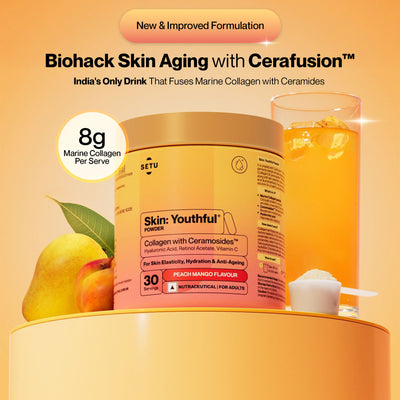A Complete Guide on Perimenopause
21 Apr 2020
Anti-aging products and articles are all the rage, but they’re almost always focused on outward appearances alone. Worse still, most only touch the surface, while neglecting one of the biggest concerns for many women – the fear that their biological clock might be ticking faster than they realize.
When talking about women’s health, the biological clock specifically refers to the ability to reproduce and the concern that this window of opportunity keeps closing with time. While no one should rush into the act of childbearing, women who are determined to have kids of their own need to pay more attention to their reproductive health and biological clock. After all, premature aging doesn’t just wreak havoc on your skin, but can also affect your ability to conceive.
What Is Perimenopause?
Menopause is to reproduction what wrinkles and greying are to skin and hair. It’s natural and inevitable, but dreaded if it comes early. Unfortunately, premature aging doesn’t just affect your hair and skin, but can also strike down there. This is described as (you guessed it) premature menopause. Whether menopause is premature or timely, it is preceded by perimenopause.
Perimenopause is basically the transition period, wherein estrogen production gradually declines until the ovaries stop releasing eggs altogether. Under normal circumstances, women enter menopause in their early 40s and experience menopause symptoms, but it has become more common for women to enter menopause significantly earlier. This is because of a rise in hormonal imbalances like drop in estrogen and other hormones due to modern day lifestyle stressors, environmental toxins, and poor nutrition, among other factors.
The signs of perimenopause starts 4-8 years before menopause, now commonly affecting women in the average age of 30s. To know what is perimenopause, you must understand that it is a far less discussed biological milestone as compared to menopause. During this phase, your pituitary glands make more follicle-stimulating hormone (FSH) over time to cause you to stop ovulating. While the process is slow, it’s concerning as it is surfacing in younger women.
Perimenopause symptoms at a young age adversely impacts fertility and libido, causing problems in your relationship and sex life. However, perimenopause does not surface without warning signs. Recognizing the signs of perimenopause can help you plan and prepare for menopause early.

Symptoms Of Premature Aging And Perimenopause
A woman’s body always has an idea of what it is capable of doing and whether or not you are prepared to take care of it. Your body may get signals and initiate the process of Perimenopause when it thinks you can’t take care of it anymore. If you are not healthy or concerned about your health, your body will take charge. But how do you differentiate between the signs of perimenopause and any other form of menstrual cycle related problems? Here are some common perimenopause symptoms and premature aging to help you get a better idea of the condition-
- Change in period flow
- Insomnia
- Mood swings
- Weight gain
- Night sweats
- Vaginal dryness
- Hot flashes
- Acne
- Feelings of exhaustion and anxiousness
- Irregular menstrual cycle
- Loss of libido

What To Do If Your Biological Clock Is Ticking Too Fast?
It may seem like you’re losing control of your life, but you’re still in the driver’s seat. You simply need to seize control and slow down. Self-care is absolutely vital and the earlier you start the better. Taking care of your mind and body are equally important and a healthy body has a direct impact on a healthy mind. Before you enter menopause or perimenopause, your body undergoes several changes and imbalances which gives your mind an indication of old age. This feeling is definitely a cause of irritation and frustration. However, if you get a better understanding of what is perimenopause, you know what needs to be done to deal with it as well. Because aging can be delayed but it cannot be reversed. Here’s what you can do to snooze that biological clock.
Meet a gynecologist: Talk to your doctor before jumping to any conclusions. If you are diagnosed with perimenopause or a hormonal imbalance, your medical expert will create a plan for you, which will include a synergistic combination of lifestyle changes, hormonal therapy, medication, diet therapy, and exercise.
Eat more protein and healthy fats: Healthy fats and protein are essential for your body to produce the hormones you need. Start indulging in a healthy diet that includes more nutritional foods such as fatty fish, nuts, poultry, seeds, etc., that are essential sources of proteins and other nutrients.
Increase your intake of zinc: Before you enter menopause, you can try eating foods that are rich in essential components which will help you delay the effects. One such important food component is Zinc. Zinc is needed for the production of important hormones that will help you slow the perimenopause process. Beans and seeds of all forms are rich in zinc.
Take vitamin B6, vitamin D3: These vitamins can help your body produce progesterone, which is essential for controlling symptoms causing an overload of estrogen production.
If you fear that taking these steps will have an impact on your fertility since you are in the average age around perimenopause and are not ready to have a baby yet, it doesn’t mean you’re doomed to childlessness. Modern fertility treatments are extremely effective and IVF specialists can even extract and store eggs for fertilization at later date, when you’re ready to have a child.
Skin: Renew - Glutathione - Orange Flavour
- ₹1,994
- ₹1,994
-
₹2,600 - ( 23% OFF)
Categories
- Choosing a selection results in a full page refresh.
- Press the space key then arrow keys to make a selection.
this is the sidecart











